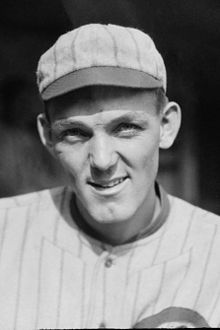Buck Weaver
| Buck Weaver | |||
|---|---|---|---|
 |
|||
| Shortstop / Third baseman | |||
|
Born: August 18, 1890 Pottstown, Pennsylvania |
|||
|
Died: January 31, 1956 (aged 65) Chicago, Illinois |
|||
|
|||
| MLB debut | |||
| April 11, 1912, for the Chicago White Sox | |||
| Last MLB appearance | |||
| September 27, 1920, for the Chicago White Sox | |||
| MLB statistics | |||
| Batting average | .272 | ||
| Home runs | 21 | ||
| Runs batted in | 421 | ||
| Teams | |||
| Career highlights and awards | |||
|
|||
George Daniel "Buck" Weaver (August 18, 1890 – January 31, 1956) was an American shortstop and third baseman in Major League Baseball who played his entire career for the Chicago White Sox. Weaver played for the 1917 World Series champion White Sox, then was one of the eight players banned from the Major Leagues for his connection to the 1919 Black Sox Scandal.
Weaver was born in Pottstown, Pennsylvania and began his major league career on April 11, 1912 as a shortstop for the White Sox. Weaver switched to third base in 1917 after Swede Risberg joined the team.
An excellent fielder, Weaver was known as the only third baseman in the league against whom Ty Cobb would not bunt. He led the majors in sacrifice hits in 1915 and 1916.
In the famous 1919 World Series, Weaver batted .324, tallying 11 hits. He also played errorless ball, lending credence to his lifelong claim that he had nothing to do with the fix.
After the Series was over, many suspicious reporters made allusions to a possible fix. However some sportwriters praised Weaver for his efforts all along during the World Series. Ross Tenney of the Cincinnati Post wrote:
Though they are hopeless and heartless, the White Sox have a hero. He is George Weaver, who plays and fights at third base. Day after day Weaver has done his work and smiled. In spite of the certain fate that closed about the hopes of the Sox, Weaver smiled and scrapped. One by one his mates gave up. Weaver continued to grin and fought harder….Weaver's smile never faded. His spirit never waned….The Reds have beaten the spirit out of the Sox all but Weaver. Buck's spirit is untouched. He was ready to die fighting. Buck is Chicago's one big hero; long may he fight and smile.
Despite this, Weaver was banned by Commissioner Kenesaw Mountain Landis for having knowledge of the fix and failing to tell team officials.
Weaver successfully sued White Sox owner Charles Comiskey for his 1921 salary. When Shoeless Joe Jackson did the same, the jury voted 11–1 in favor of Jackson. However, the judge set aside the jury verdict after Comiskey produced Jackson's grand jury testimony about the fix. Despite this success, however, Comiskey made no attempt to offer the confessions as evidence to obtain a similar ruling against Weaver.
...
Wikipedia
